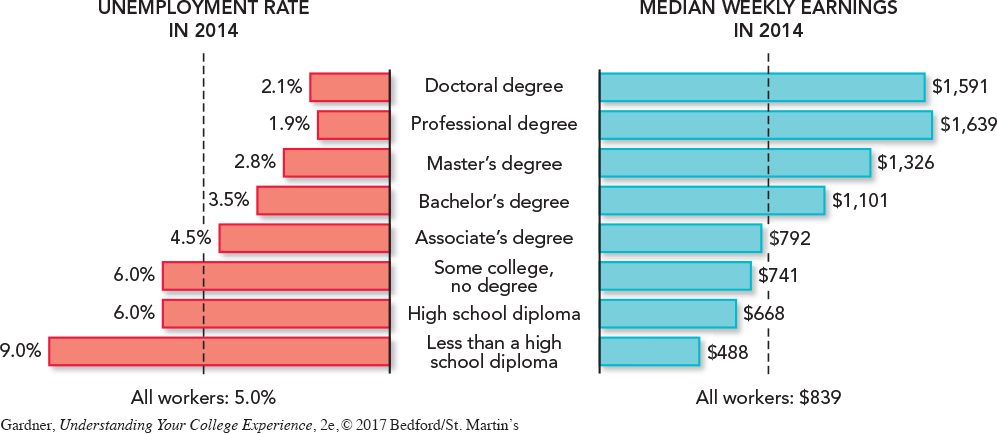1.1 THE COLLEGE EXPERIENCE
Depending on who you are, what your life situation is, and why you decided to enroll, college can mean different things. Some students choose to attend college to learn a specific set of skills, receive training for specific careers, and earn a certificate or diploma that allows them to get jobs in their field of interest after graduation. Some attend college to complete their associate degree perhaps close to home and at a lower cost and then, if their college does not offer the higher degree they wish to obtain, to transfer to a four-year college or university for a bachelor’s degree. Some come to college after a major life event or personal transition, such as divorce or loss of life partner. Others start or return to college after retirement for the sheer love of learning.
College is some students’ top priority; for others, it can be an additional priority on top of family or work obligations. Some students already have jobs but want to change their careers or improve their chances for a promotion. Some students come to the United States from other countries just to study. College is really far more than any single image you might carry around in your head about why students attend and what the college experience actually involves.
Whether you have just graduated from high school or are an older student with a job and a family, college will be a time when you take some appropriate risks, learn new things, and meet new and different people—all in a supportive environment.
Did You Make the Right Choice to Attend College?
You have joined more than 20 million other students enrolled in about 4,400 colleges and universities in the United States. American society values higher education because receiving a college degree gives you opportunities for success regardless of your race or ethnic background, national origin, immigration status, family income level, family history, or personal connections. One marker of success is the amount of money that you earn both immediately after earning a degree and over a lifetime. What you earn in the future will depend on what you learn and do now. As Figure 1.1 shows, the more education you have, the more likely you are to be employed and the higher your earnings will be.

In addition to increasing your earning power, college is about helping you become a better thinker and a leader in your community, company, or profession. In short, college can change your life for the better.
What Opportunities Does College Provide?
Two-year colleges and some four-year institutions offer certificates, associate in arts (AA), associate in science (AS), associate in applied science (AAS), and bachelor in arts (BA) or science (BS) degree programs (see Table 1.1). These institutions play an important role in providing students with educational opportunities because they accept and work with all students regardless of their past academic performance. In addition, students can get a great education at a much lower cost than at a college or university that awards only four-year degrees. The education that you receive will help you start, restart, and be successful in your future career and life.
| Degree | Refers to the type of diploma students receive after graduation and differs based on the number of credit hours students complete. |
| Credit Hours | Represent the number of clock hours you spend in each class every week during a term and the number of credits you will earn if you satisfactorily complete a course. For example, a one-credit course generally meets once a week for 50 to 60 minutes. |
| Degree Programs | |
| Certificate Program | Certificate programs include a set number of courses (usually 30 credits) that prepare students to complete a specific task or educate them about one particular aspect of a field to be able to obtain entry-level positions. For example, an Emergency Medical Technician certificate program prepares students to enter the field of emergency medicine and start working as first responders. |
| Associate in Arts (AA) or Associate in Science (AS) | These programs carry about 60 credits and allow students to transfer to four-year programs to obtain bachelor’s degrees. |
| Associate in Applied Science (AAS) | These programs carry about 60 credits focused on training students for a specific profession or career. The AAS degree has fewer transferable credits than the AA or AS degrees. |
| Bachelor of Arts (BA) or Bachelor of Science (BS) | Four-year programs that carry about 120 credits. |

In addition to being a pleasant experience, college is a lot of work. Being in college means studying for hours each week, staying up late or getting up early to complete assignments and prepare for class, going to class, taking exams, and possibly working harder than you ever have. For many students, college becomes like a job with defined duties, expectations, and obligations. If you already have a job, this will be your second one. And if you have a family of your own, college will be your third job!
Getting involved in campus life improves your college experience and your chances for a good job, so make sure to take advantage of student activities on your campus. For example, some clubs are related to professions; an education club may include students who plan to become teachers, or a business club may give students an opportunity to learn more about companies in their area and to interact with business professionals and leaders. The most important type of involvement, however, is with fellow students who you can get to know, study with, and share mutual support.
College will also provide you with numerous opportunities to
complete the basic skills training you didn’t master in high school.
develop social networks both in person and online.
explore student organizations and take advantage of leadership opportunities.
participate in many exciting activities and events.
network for improved employment opportunities.
go to college after serving in the military.
What Is Your Purpose for Attending College?
Having a purpose for going to college is essential. Without a purpose, you won’t know where you’re going or how to get there. While some students come to college with a clear sense of purpose, others do not. For many students a strong sense of purpose builds over time. College will be a set of experiences that will help you to clarify your purpose and achieve your own goals. It is possible that as you discover more about yourself and your abilities, your reasons for coming to college will change. In fact, a majority of college students change their academic plans at least once during the college years, and some students find they need to transfer to another college or university to meet their academic goals.
Here are some questions to ask yourself about your purpose for being in college:
Am I here to study a subject that interests me?
Am I here to develop new knowledge and ideas?
Am I here to complete a certificate, a diploma, or an associate or bachelor’s degree?
Am I here to prepare myself for employment or to improve my skills in a job I already have?
Am I here to meet new people?
Am I here so I can better serve my community and country?
Am I here to better understand myself and society?
Your honest answers to these questions will drive most of the decisions that you make in college, decisions that will likely impact the rest of your life. Because knowledge expands all the time, college classes won’t teach you everything you will ever need to know, but college, as a process of formal education, will teach you how to think and how to keep learning throughout your life.
YOUR TURN > WORK TOGETHER

Ask a couple of your classmates why they decided to attend this college and what they expect college to be like. Compare your reasons and expectations with theirs. Do you find similarities or differences?
How Is Your College Committed to Helping You Succeed?

Each college has two main objectives: to help its students graduate and to support them in becoming successful in their future careers. To do that, colleges provide support services to students at no additional cost. For example, most colleges have academic advisers who provide students with information about their courses and help them register in the appropriate courses every term. These advisers are available to students throughout the term to provide guidance and support and to answer questions students might have. Colleges also have financial aid advisers who can assist students and their families in understanding how to pay for college.
Additionally, most colleges have learning centers, providing free tutoring to students in nearly all subjects, and career centers that help students with career planning and job hunting. Remember that the faculty and staff of a college are there to serve students and meet their needs and help students to become successful, so do not be shy—ask for help. To assist you in identifying and using your college resources, at the end of each chapter in this book, we provide a list of resources typically available at colleges—resources that offer additional help related to chapter topics. Students who seek help are the ones who are the most successful, so take advantage of the support available to you.
What Will You Get Out of Your College Success Course and This Textbook?
Research shows that college success courses, such as this one, will help you and other first-year students avoid some of the mistakes—both academic and personal—that many beginning students make, such as not taking advantage of the helping services and resources, not developing certain college-level study skills, and making choices that you would have made differently if you had the knowledge you really needed.
This course will provide a safe place for sharing your successes and your challenges, getting to know other first-year students, beginning a lasting relationship with your instructor and other students, developing your academic plan based on your strengths and interests, and shaping or reshaping your career after graduation.
As individuals with many years of experience working with first-year students, we know that starting college can be challenging. However if you apply the ideas in this book to your everyday life, you are more likely to enjoy your time in college, graduate, and achieve your goals. In this textbook, we cover a lot of topics. For instance, you’ll read about managing your time, taking notes, making the most of the way you learn, preparing for tests, building relationships, and planning for your future career.